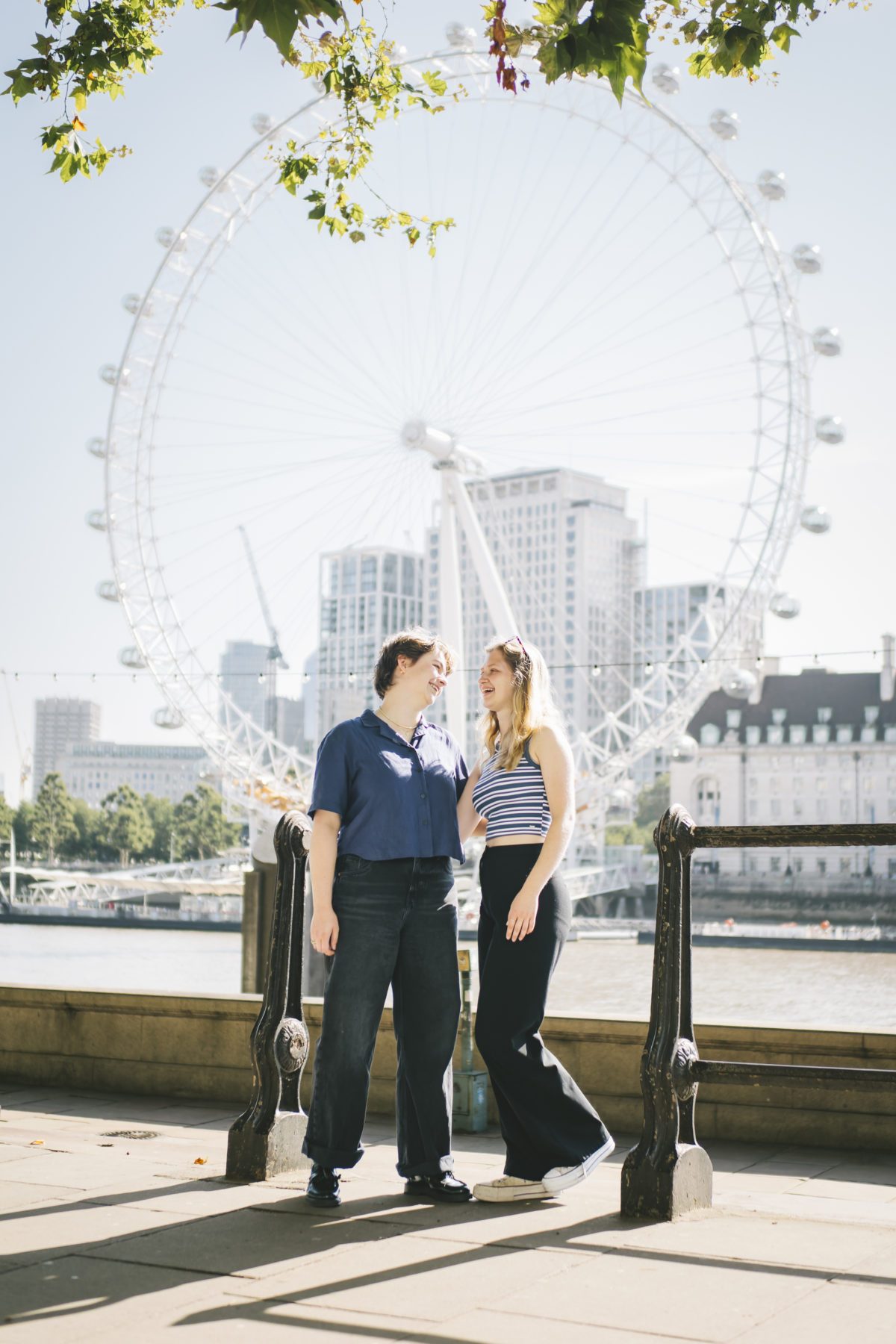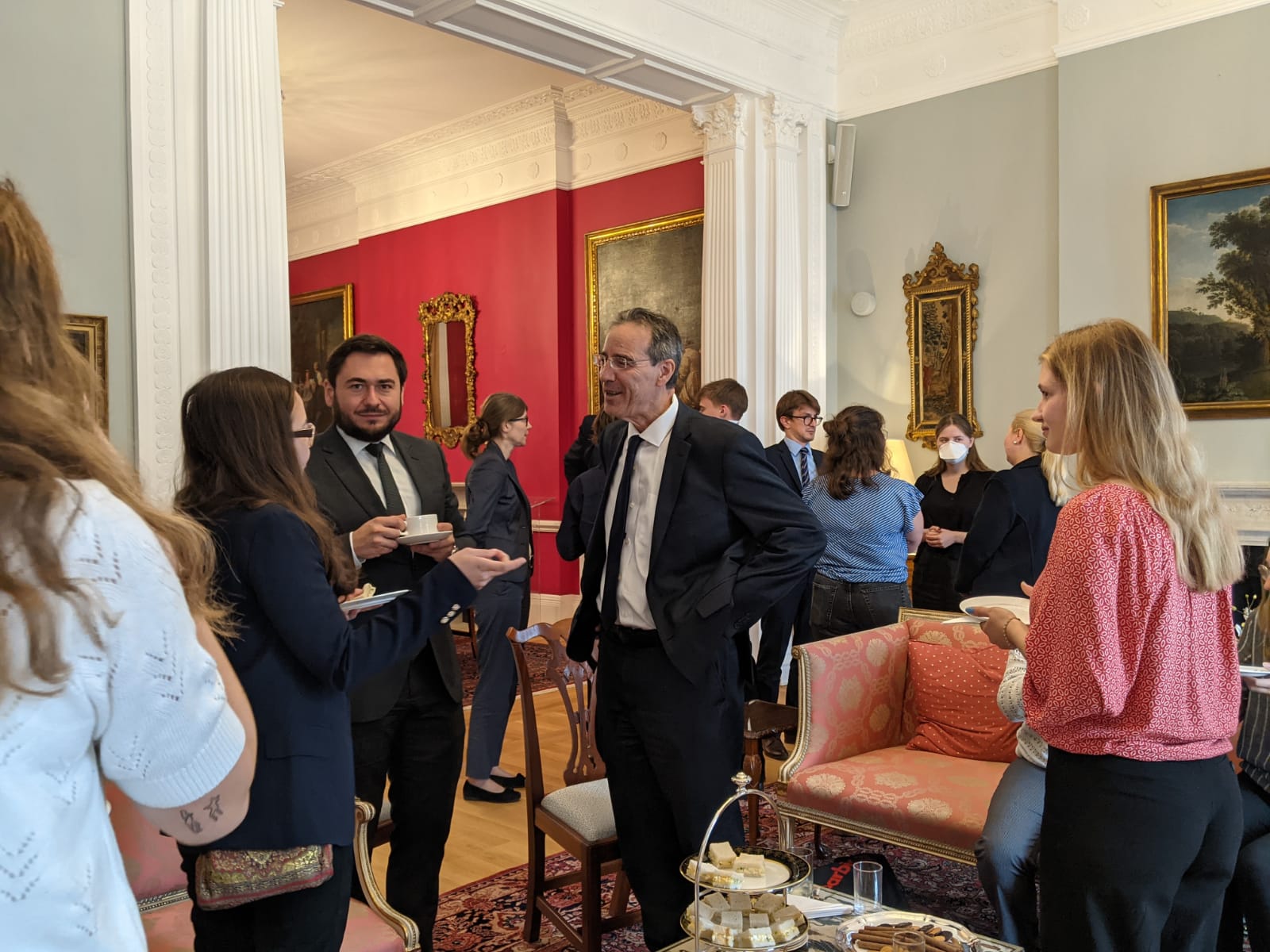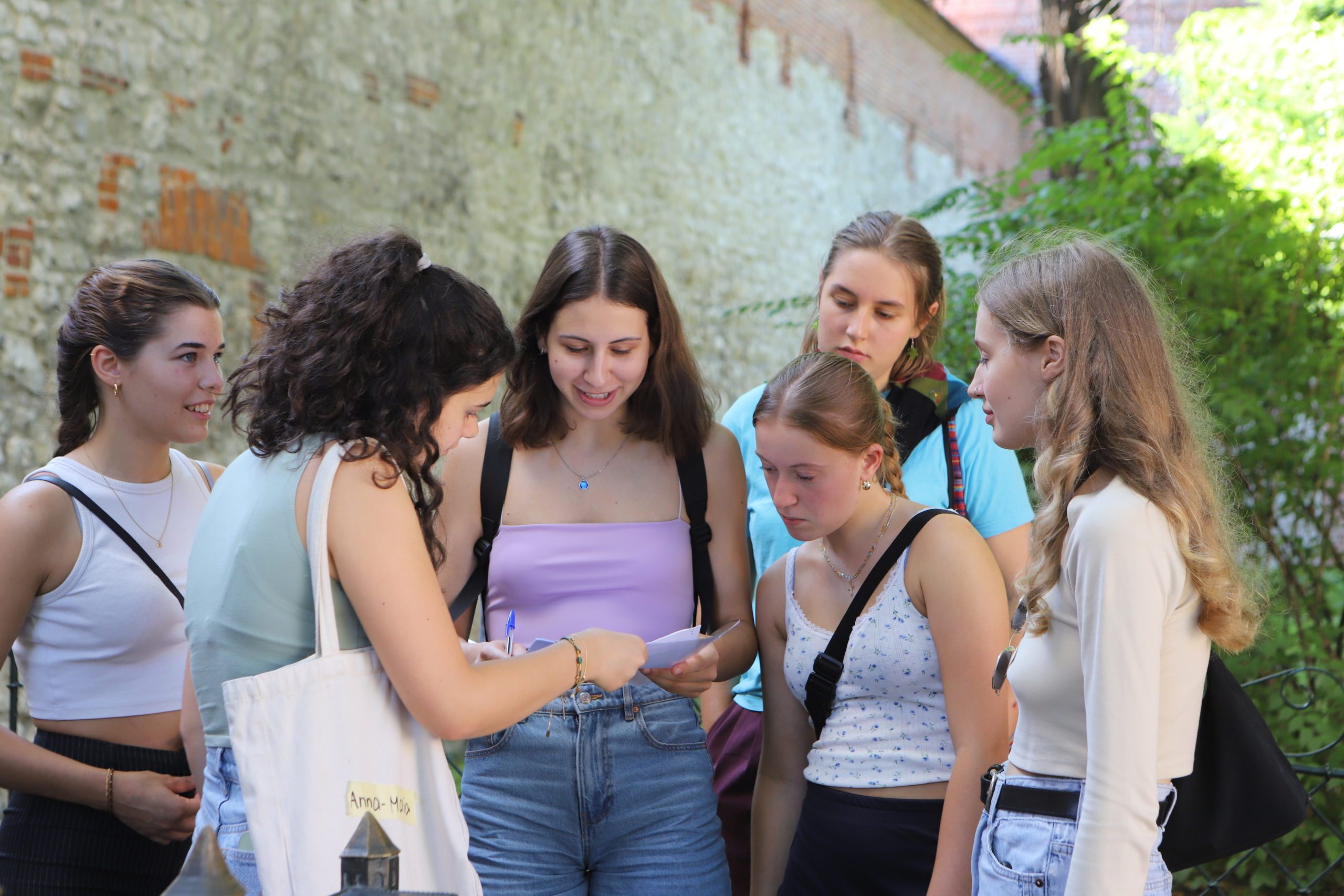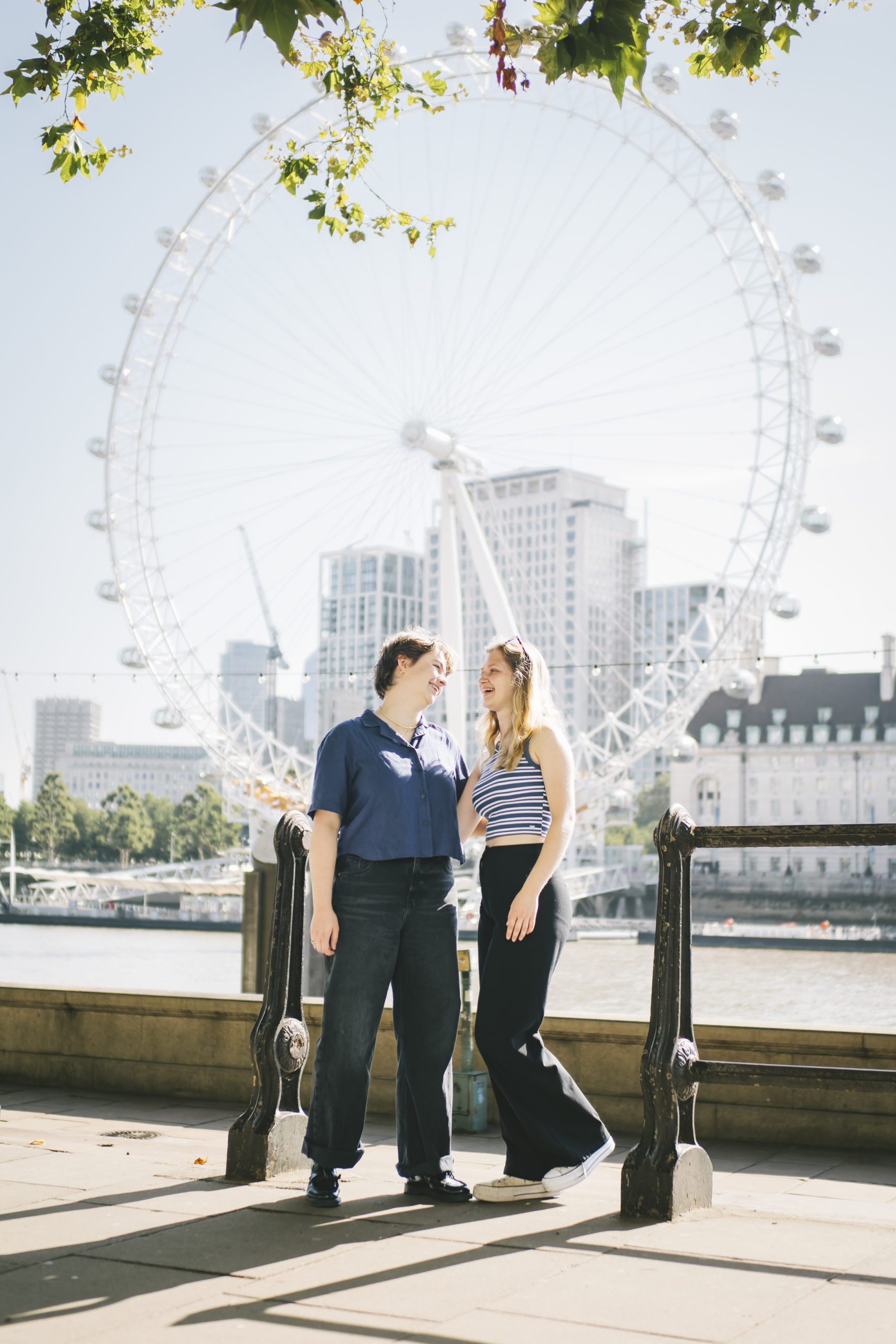Freiwillige berichten, Neuigkeiten
A German Volunteer in the UK reports: Greta Bauer – ARSP volunteer at the AJR

The English summer has arrived and I am enjoying the light evenings, the summer breeze and the ease it comes with. At the start of my year abroad, the summer always seemed so far away and we saw it as a showing of time so that when it arrived we were sure this precious year was coming to an end.
Thinking back to the end of the last summer: anxiously and curiously arriving at our first seminar with ARSP in Krakow, meeting the other volunteers and ARSP as an organisation, but most importantly getting to know my future workplace – the Association of Jewish Refugees – it all seems so far gone and has become a distant memory due to all the impressions I was able to collect within the past 11 months.
Small tasks, like answering the phone in the office, remembering the names of all my new coworkers and mastering the art of British small talk, who used to feel slightly daunting have become easy and happen without a second thought. I can confidently say that I feel like I have successfully settled in and belong to a team of amazing people.
During the latter part of my time at the AJR I have been able to continue and expand my appreciated visits to some of our members – Jewish Refugees or Survivors of the Holocaust and their descendants, who are the essential core and reason of the AJR. In addition, I was able to help at an International Conference regarding Holocaust Testimony, witness the different means the AJR uses to preserve and commemorate the legacy of its members and continue to help out at some of our group activities. In participating in those projects I was able to learn more about and experience Jewish Life in its richness and generally take away many life lessons, memories and thoughts regarding the past and future.
As the seasons evolved, so did my relationships with the members. With ongoing time Holocaust Survivors and Refugees are getting older and so are the members of the AJR. With that come many pressing issues one has to confront, especially the way we commemorate the memories and testimonies of each individual. I have experienced how fragile these shared remaining moments are. On the one hand, those moments need intimacy which has to develop over time. On the other hand, this time is more abbreviated, as I have experienced members sadly leaving us and witnessing others lose their memories. This makes the members and me aware of time and therefore we thoroughly enjoy what we have together for the present moment.
I visit five members regularly, with whom I share very different and fond memories, exchange laughs, thoughts, music and get to know their stories.
Generally one can categorise my visits into three groups, memory loss befriending, general befriending and working with testimony. As I focused on the latter two kinds of relationships in my last report I would like to tell you more about two of our members I visit weekly who suffer from dementia.
One of them, Mrs W, whom I have started visiting in Autumn and I spend our time with her and her Husband Mr W. At the beginning, it was planned that I would take Mrs W. out for a little walk and coffee every week in her lovely neighbourhood in North London. However, as she suffered an injury and her dementia progressed, this plan had to move aside and I now spend our shared time with her and her husband. Even though Mrs W. is quite quiet and reserved I always see her reacting, listening and sometimes even chuckling when Mr. W and I have some of our conversations.
Mrs W. is part of the second generation, meaning she was born in the UK but both of her parents sought refuge in the UK due to being persecuted in Czechoslovakia. Her parents met each other in Prague at the University where both of them were politically active. Right before the war, her mother found a way to get to the UK through her studies and her father to northern Europe, from where he was allowed to come to the UK in September 1939.
Mrs W. was born shortly after and her father went on to fight in the war but tragically died in France on a mission while she was still a very small child. During his time serving the country, he wrote many letters to his wife in German and I had the honour of reading and translating some of them for Mrs and Mr W. Among others, the very last message Mrs W. and her mother got from her father, when he was already conscious of the risk he was taking and the possible outcome.
Another way through which Mr W. tries to keep the memory of Mrs W’s family and their testimony alive is by telling me about their story and about the family who had to stay in Czechoslovakia. Mrs W’s relatives left in Czechoslovakia were deported to Ghettos and Concentration Camps. A big part of her extended family was brought to Theresienstadt among them was a distant cousin of hers, who was still a young girl of only eleven years old. Her name is Helga and she always loved to draw and continued to do so in her time at Theresienstadt. As her father was sadly separated from her and the rest of the family she wrote letters to him with drawings of herself attached to them. As he received the letters he wrote to her to “draw what you see” instead of just a happy imaginary picture of better times. Following this she started documenting the suffering and cruelty she witnessed every day. Helga survived Theresienstadt as well as other Concentration Camps and later on, continued making art, creating many pieces dealing with the trauma she experienced. Miraculously many of her drawings survived the Concentration Camp and she later decided to publish a book with her drawings from that time. This moving piece of Holocaust testimony now lives on and depicts the torture and horror from a girl’s view, having to grow up too quickly.
Being able to look at this testimony of her past, while knowing some of her stories, her family’s fate and the fate of many other Jews from Theresienstadt affects me deeply – I can not find a language to express this cruelty and suffering. During my time here I ask myself many questions and can not understand.
Due to Mrs W’s family having been at Theresienstadt we often talk about the history of it and the life lived there. Mr W. always prepares some media to show me during our long talks – this makes the history much more personal and showcases again the individual stories that were lost and found there. For instance, he connects our shared interest in music with history when showing me some of the music produced and written in Theresienstadt.
Mr W. however does not just teach me about the testimony of his wife’s family but likes to take Mrs W. and me out to all the different parks in London and show me his and his wife’s favourite coffee spots and places to walk, talk and relax. Being outside and listening to our shared conversation always makes Mrs W. feel more awake and present. After now having visited her for several months I can tell that she is recognizing me and we love to share some knowing glances that bring out hidden smiles on our faces. Mr W. tells me that even if Mrs W. might not remember that I was there later that day, the feeling of someone having visited and spent time with her makes her feel more content.
Another Member I visit is Mrs R., an extraordinary lady who is already 100 years old and one can tell, despite her very advanced dementia, that she is still in her way incredibly clever.
Mrs R. grew up in Berlin, which she proudly announces every once in a while (“Ich bin eine Berlinerin!”). Her father was a Berliner and her mother came from Hungary. What astonishes me every time I see her, is that despite not remembering much, she still likes to speak French, English and German and every once in a while throws some Hungarian words around. Our conversations differ in many ways from Mrs Ws and mine, since Mrs R. likes to joke and is always very lively when I come and thoroughly likes to talk about the current realities she might find herself in. Even though she forgets what happened in the last five minutes and I have to introduce myself every so often, we joke about her being my age, going dancing in Italy together, what boys she currently likes and we sing together to Marlene Dietrich and Ellen Fitzgerald. She gets completely immersed in our conversations and whenever I leave she tells me that she is looking forward to her next visit from this elegant young lady to which I reply that it is always an honour to spend some time with this truly magnificent Berlinerin and we both laugh as I leave the room.
Visiting these two ladies is a very different experience since the visits with Mrs W. are strongly influenced by my conversations with Mr W. telling me about her family’s testimony and with Mrs R. I do not have any knowledge about her past and am unaware of her testimony. However, both visits are confronted with the problem of losing memories and therefore their testimony. Being aware of this problem the AJR held an international conference regarding holocaust testimony this spring. My fellow volunteer Clara and I were helping with organising the Forum which spread over three days with speakers coming from all over the world and from different academic backgrounds.
While we had to run around and help with the organisational and practical tasks we were also able to listen to the talks, podium discussions and lectures. Being able to hear how other organisations, museums and research facilities work around the pressing issue of losing first-hand testimony was incredibly interesting and eye-opening.
We heard talks from speakers who are still working with face-to-face testimony today and from others trying new technologies like interactive holograms. Seeing how they are trying to find the best, most authentic and moving way to continue to carry the individual stories of Survivors and Refugees was giving us all hope that there are people who care about every story and are trying to make a record of the ones not yet preserved, like the AJR with their Refugee Voices Archive.
As I am visiting Mrs W. who is a Second Generation Refugee and her spouse telling me about her family, it was very interesting to hear discussions and different viewpoints about 4 live testimony from relatives of the Eye Witness. During the Conference, it was explained that it was declared after the Second World War that every testimony from someone of the first Generation is to be seen as truthful. But what happens when for example the child of the Eye Witness is telling the story of their parent? Is this still eligible testimony? Regarding this question, we heard Spouses, Children, Authors and Historians share their own experiences and how for example they get put into the situation of feeling the need to continue to share the stories of the Survivor. For instance, one woman was talking about how she started accompanying her mother to groups to share the mother’s testimony, but as she got older her mother’s talks became more interweaved with her as she had to fill in information whenever her mother was too exhausted to speak. As the mother became unable to share her testimony, the daughter continued going to schools, and other institutions to retell her mother’s life story and keep her legacy alive. The urge to protect the testimony of one’s parents is something we can see strongly within the AJR with our second-generation members. They are concerned that the stories of their parents will be lost, and with it a piece of their own identity, as their parents’ past has shaped them and the following generations immensely. We see that they want to take action against forgetting. Therefore we as well had many other descendants of holocaust survivors at the conference who shared their means and interest in keeping history alive. One way some descendants find a way to archive their family members’ legacy is by writing about them. I have heard on many occasions that through this extensive research, they get to understand their relatives on a deeper level and one could see that many refugees and survivors were not able to share everything with the people close to them. Some historians addressed this phenomenon as well, saying that through personal distance to the interviewer, the survivors were able to open up more about their past and sometimes even told things they could never share with anyone before.
As I am interested in the Arts, it was very interesting for me to get an insight into how for example historians, actors and theatre producers work with testimony creatively. So far I have encountered Holocaust testimony through art in different forms. For instance the artwork as a method to process what happened to oneself in the past, like Helga has done in some of her works or as a medium to retell a story in its complete form like done in theatre productions.
As a representation of the latter, I was able to see a theatre play on the West End, called Rose by Martin Sherman. The protagonist Rose tells us her story in which she survived occupied Warsaw to immigrating to the US after the second world war and climbing the economic ladder as a Jewish woman. She tells us the story of the last century and the horrors which happened in the past but are still so crucial to remember nowadays since we still live among anger, hatred and violence against others. The play itself was staged very minimalistic with Rose sitting Shiva on a wooden bench and retelling the audience the story of her life – she was giving us her testimony and the testimony of many European Jews from the 20th century. However, when reflecting on the play many questions arose like: Who has the right to portray a survivor and how far can the actor change the reception of the testimony by interpreting the role as an actor? Why let an actor perform a made-up testimony and not give the space to survivors to share their testimony? Why do we have to invent a testimony if there are so many stories of survivors and refugees? Could this be a method in the future to continue to portray testimony in an emotional, involving and not just factual manner?
Nevertheless, these are not the only questions that keep my mind occupied. I get to learn so much about Judaism, its culture and what it means to be Jewish today. I am very grateful for the kindness of my colleagues and the members of the AJR, who explain and show me so much, invite me to the synagogue and their houses on Shabbat and always engage in a warm and open dialogue with me!
At school, I primarily learned about the Shoah and the persecution of Jewish life. If one does not know much about Jewish culture, one’s own perception of Jewish history is incredibly limited. As a result of this lack of knowledge, the understanding of the rich influence that Jewish culture has had and still has on our entire society is lost. My year abroad is influenced by my work at the AJR and the encounters I have with the members but also by the rich and diverse culture in London. I am lucky to spend this year with my fellow volunteers, whom I can confidently call my friends. We explore the city and parts of the country together but as well offer each other a safe space to reflect on the experiences we gather at our projects. This space is encouraged by ARSP during our seminars, where we analyse definitions like “Genocide” and “Crimes against Humanity” and our own heritage. These conversations and moments of community, as well as the constant and great support from our country coordinator, encouraged and supported me throughout the year!
This immense variety of access to information made me decide that I would like to broaden my general knowledge before focusing on one area of expertise in my studies. While deciding on my future studies I will do a one-year studium generale upon my return. I can confidently say that these past eleven months are of incredible value to me – the encounters I made here will stay with me and continue to shape who I am and my future.
At this point I would like to express my deepest gratitude to my sponsors, my wonderful project partner the Association of Jewish Refugees, our ARSP, Action Reconciliation Service of Peace and the International Youth Volunteer Service for their generous support and all the opportunities they have given me during my time here!


